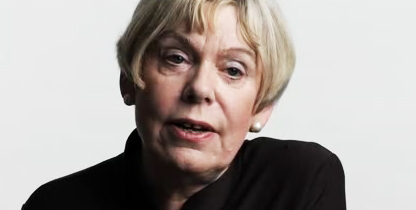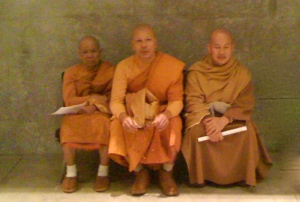Transcendence from, not to
By Susan Caba
Resale Evangelista
Do you meditate?
I try, off and on, in my continual quest for a simplified life. Over the years, I’ve read the books, practiced the breathing, listened to the sacred chants of the Buddha.
But I’ve never reached that frame of mind (or no mind) variously described as “a place of “infinite being” or “floating at one with the universe.” In other words, transcendence.
This weekend, I got a clue as to why not. I’ve been going at it from the wrong direction. (I know, I know, you’re not supposed to strive for a goal in meditation, “just sitting” is supposed to be enough. I’m sorry, no.)
 The word came via the radio, in the starchy British voice of author Karen Armstrong. A former nun turned expert on world religions, Armstrong calls herself a “freelance monotheist.”
The word came via the radio, in the starchy British voice of author Karen Armstrong. A former nun turned expert on world religions, Armstrong calls herself a “freelance monotheist.”
She couldn’t get the hang of meditation at first, either. She went into the convent at 17 and, as she wrote recently in the Huffington Post, “I was completely unable to pray. Every morning I would go into the chapel to make my meditation, and struggled with boredom, sleepiness and endless distractions.”
Armstrong left the convent after seven years, entered broadcasting and, over time, became a leading expert on the world’s spiritual traditions. Her work is scholarly but refreshingly modern.
Compassion and transcendence were the topics in a recent interview with journalist Steve Paulson, on Wisconsin Public Radio’s program, To The Best of Our Knowledge.Armstrong started off by saying that “we are talking far too much about God.” Pretty radical, for an author whose latest book is “The Case for God.”
“What we call God lies beyond the reach of speech and reason,” she said, adding that the concept of God is “ a symbol for a much greater transcendence beyond anything we can think or know.”
Don’t we need a definition of transcendence, Paulson asked, if the search for that spiritual state is what world religions are about?
There is no adequate definition of transcendence, she said.
She recounted a competition among monks in India, in the 10th century BC. The priests competed to name and define Brahman, the ultimate reality for Hindus. One would start by offering a learned, poetic and elliptical definition. Challengers would jump in to elaborate, with the discussion becoming “ever more complex and beautiful and learned.”
 “But the winner was the person who reduced everybody to silence. And in that silence the Brahman was present. The Brahman was not felt in the wordy definitions, but in the stunning realization, the stunning experience of the impotence of speech…
“But the winner was the person who reduced everybody to silence. And in that silence the Brahman was present. The Brahman was not felt in the wordy definitions, but in the stunning realization, the stunning experience of the impotence of speech…
“Think of what happens at the symphony, when the last note dies away. There’s often a beat of silence before the applause begins, a sort of very pregnant silence in the concert hall … theology—a word that means discourse about God—the purpose of theology is to help people live in that silence, in that beat of silence.”
How do you reach that silence?
“You get there by … adopting a self-emptying lifestyle that gets beyond egotism and greed, and does that by means of a compassionate lifestyle.”
“I’ve been studying world religions for more than 25 years now and I am constantly pushed up by all the world’s traditions to this notion of compassion as the litmus test of true spirituality.”
And here is where Armstrong’s words enlightened me on how I was going wrong in my attempts to meditate:
“Basically, all the world’s traditions developed their own version of the Golden Rule: Don’t do to others what you wouldn’t want them to do to you.”
“This requires constant transcendence of your self—it requires us constantly to dethrone ourselves from the center of our own world, to look into our hearts and discover what gives us pain and then refuse … to inflict that pain on anybody else. If you do this all day, and every day, you are in a state of continual … stepping outside of the self.
“We have started to concentrate far too much on what we’re transcending to, what we’re going to, instead of what we are transcending from, what we are getting beyond.”
There it is—I get that. I’m not up to universal compassion. But I can deal with pushing aside my own petty or selfish inclinations, one by one.
Now that I know I don’t have to find myself at one with the universe, I’ll enjoy the fleeting beats of silence that come my way.


Had a lengthy conversation about meditation and transcendence with Cathy Luh and Laurie Vincent after this post. I’ll have to get back to the topic sometime soon.
LikeLike
Brilliant post, just loved it as I’m working on dethroning myself too. 🙂 Thanks Sue!
LikeLike